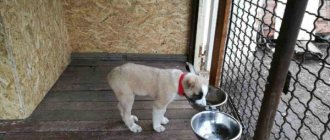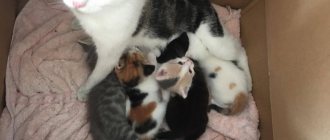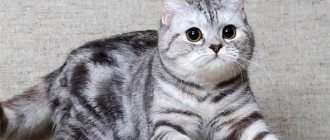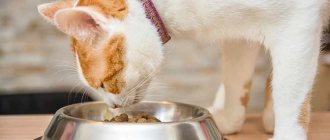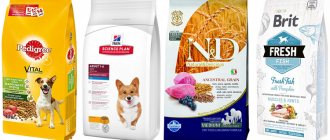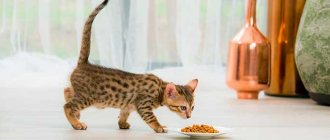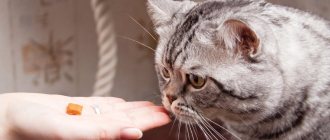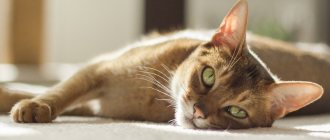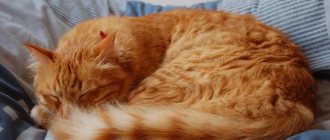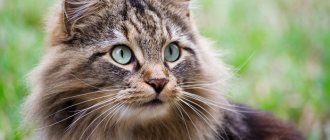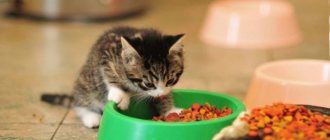Up to a month
Until the age of one month, kittens should feed exclusively on mother's milk.
Under circumstances that do not allow natural feeding, the kitten is transferred to a cat's milk replacer. Natural menu:
- Goat milk diluted with boiled water.
- Scott's kitten mix.
- Tiling mix for kittens.
Industrial menu:
- Cat milk replacer.
- From 1.5–2 weeks – infant formula “from 0” (without additives and sugar).
The daily food intake for an Abyssinian kitten under the age of one month ranges from 30 to 50 ml, depending on the number of babies in the litter, individual characteristics and dimensions. Number of feedings for an Abyssinian kitten under one month of age:
- From birth to 2 weeks, feeding every 2 hours – 10 times a day.
- From 2 to 4 weeks, feeding every 2–3 hours – 8 times a day.
When artificially feeding kittens, it is important to do everything possible to ensure that their intestinal microflora is formed correctly and in a timely manner. Diarrhea or other problems with digestion of food are deadly for babies under one month of age.
Advice: if you do not have experience feeding newborn kittens, it is better to consult a veterinarian.
Feeding the kitten.
Experts recommend feeding an Abyssinian kitten exclusively with mother's milk for up to one year. If it turns out that for some reason the kitten is left without a mother, or the mother simply does not have milk, formula for kittens will come to the rescue. Purchase mixtures from specialized pet stores.
An Abyssinian kitten needs to be fed starting from three months of age. There may be an upset stomach due to unfamiliar food, but this will soon pass. Start complementary feeding with baby food, with meat puree intended for kittens. Don't forget that a kitten's stomach is very small. You need to feed him very small portions several times a day.
What type of food is best for Abyssinian cats?
Foreign breeders recommend feeding Abyssinians with wet, dry and freeze-dried food. Many of them believe that constantly feeding one type of food can lead to health problems.
Each type of food has its pros and cons. For example, excessive consumption of wet food (canned food) can lead to stomach problems and diarrhea (diarrhea). Dry cat food is known for its high nutritional value as it has a good combination of carbohydrates and proteins. In addition, it does not spoil as quickly as canned food.
We invite you to familiarize yourself with everything about the dwarf ram rabbit breed
Constant feeding of dry food can lead (especially if the cat drinks little water) to problems with the kidneys and urinary tract. In addition, non-premium and super premium dry food contains various grains that are difficult for Abyssinian cats to digest, which can cause allergies and inflammation of the gastrointestinal tract.
Tips for feeding Abyssinians.
The royal imprint is left on Abyssinian cats in terms of feeding. It is quite difficult for Abyssinians to find food and get treats. The Abyssinians' diet should be balanced and contain a sufficient amount of vitamins and minerals. Suitable for both dry and wet food for purebred cats, which is sold in pet stores or specialized departments.
- Dry food. For Abyssinians, dry food is the main food, so their choice should be taken seriously. Nowadays, stores offer hundreds of companies and manufacturers of dry food, with different prices. It’s better to buy more expensive ones, because the health of your cats depends on nutrition. Don't forget that your cat should always have a full bowl of water to drink. Approximately 120-140 ml. The cat should drink clean water every day; change the water for your pet once a day. You also need to purchase the right bowl for the Abyssinian; the cat’s bowl should not be light, since the cat will turn it over; it is better to purchase a heavier bowl.
- Wet food. It is not recommended to feed him constantly with wet food; preference should be given to dry food for daily use. Eating wet food is considered only a supplement to the diet. Its advantage over wet one is that it is able to clean the animal’s teeth, and also does not create microflora for the development of microbes. Wet food should be given to your cat as a treat. There is a huge variety of wet food on store shelves; choosing one is not difficult; there is a delicacy for even the most picky cats.
- Meat. Your beloved Abyssinian should be fed meat for proper nutrition. Protein is the main part of proper nutrition for Abyssinian cats. Chicken and veal meat are suitable; young lamb meat has proven itself well among the Abyssinians. It is better not to give pork to cats, as it may contain helminths. Meat is an ideal addition to a cat's diet.
- Fish. Sometimes you can please your pet with a piece of sea fish. Fish from other bodies of water can be dangerous, as they may contain helminths. Some cats cannot resist various seafood and even eat shrimp. Try giving your pet a new treat gradually, starting with small quantities to avoid possible troubles. If your cat likes the fish, feed it without fear.
- Dairy and fermented milk products. You can sometimes pamper your cat with homemade sour cream or cottage cheese; perhaps she will like yogurt or milk. Be careful with dairy products; introduce them into your diet gradually to avoid stomach upset.
- Vegetables and fruits. Many Abyssinians cannot resist various fruits. Your pet can be fed fruit, provided that there is no allergy to this type of fruit. Many cats prefer to eat fruit. Such cats will not refuse a piece of sweet melon.
READ Character, care and nutrition of the Devon Rex
It is worth paying attention to the fact that all Abyssinians need to be fed and cared for individually.
Kittens, nursing cats and neutered cats, as well as obese cats, should be fed differently, with an individual approach to each animal.
Natural diet
A natural diet for an Abyssinian kitten includes:
- Feeding raw and cooked foods in pure and mixed form.
- Feeding exclusively raw foods.
- Feeding with homemade semi-finished products.
Benefits of a natural diet:
- You can control the freshness and quality of the products.
- The ability to regulate the calorie content of food.
- Taste variety.
- Saving money - a natural diet is 2-3 times cheaper than food of similar quality.
Disadvantages of a natural diet:
- Time-consuming – cat food needs to be prepared separately and regularly.
- Natural food should not be left in an automatic feeder.
- With a natural diet, the cat needs to regularly take vitamin courses.
An Abyssinian kitten can be switched to a natural diet from the age of one month.
- Up to 4 months, the diet should be based on dairy products.
- From 4 months, some cats develop lactose intolerance; in this case, whole milk is replaced with fermented milk products.
- By the age of 8–9 months, the owner needs to accustom the cat to a diet of healthy foods, since it is extremely difficult to accustom adult animals to eat vegetables.
Vitamins and supplements in the diet of an Abyssinian kitten
With a natural type of feeding, up to a year on an ongoing basis, and after a year in courses, the Abyssinian kitten needs vitamins and supplements. Natural vitamin supplements for the Abyssinian kitten:
- Meat and bone meal.
- Fish, chicken, beef liver.
- Greens, vegetables, fruits.
- Sunflower oil, olive oil.
- Brewer's yeast.
For normal growth and a full life, cats need taurine.
Active cats need large amounts of this rare amino acid, so rich sources of taurine should be included in the diet:
- Turkey.
- Rabbit.
- Chicken heart, liver.
- Beef heart.
- Pork, ham, trimmed of fat, after deep freezing.
- Pork liver, heat-treated.
- Ocean fish, shellfish.
- Raw red fish.
- Homemade live yogurt.
- Whole milk.
In addition to natural sources of nutrients, you can resort to pharmaceutical products:
- Fish fat.
- Feed tricalcium phosphate.
- Omega-3, Omega-6.
- B vitamins.
Advice: if you are worried that you will not be able to correctly calculate the doses of vitamins, there is an alternative - industrial vitamin complexes for kittens.
Natural diet for Abyssinian cats
Abyssinian cats are medium-sized animals, short-haired, active, and lead an active lifestyle. This is not a listing of external data, but an indication of the importance of quality feeding. Nutritional deficiency, which an ordinary fluffy cat can easily hide under a thick fur coat, will be clearly visible in a lean Abyssinian.
In the first place is a diet of natural products. The Abyssinian breed is a direct descendant of wild African and Asian cats, which are genetically predisposed to such a diet.
What to feed?
Types of food: which is the best brand?
According to veterinarians, the most suitable types of packs and dry pads are presented in the table:
| Brand | pros | Minuses |
| Acana | 75% is meat or fish | Lack of a ruler for castrati |
| Fresh meat products | Not suitable for those prone to constipation | |
| No dyes or preservatives | High price | |
| Orijen | 85% protein | |
| Omega-3 and Omega-6 acids | Low prevalence | |
| Arden Grange | Prebiotic content | Contraindicated in case of corn intolerance |
| Joint Strengthening Supplements | ||
| GuabiNatural | Correct ratio of protein and lipids | Gluten content |
| Enriched with vitamins | Porcine blood plasma | |
| FarminaMatisse | Dried meat and fish | Lack of complete information about the composition |
| No dyes or preservatives | Average meat to vegetable ratios | |
| Low cost | Possibility of an allergic reaction |
Natural feed
For children, to improve appetite, you can combine products, for example, add honey to porridge with milk, and mix cottage cheese with egg yolk.
Your Abyssinian can be given the following fresh foods shown in the table as an alternative to dry food:
| Type of food | Product | Age, months | Optimal amount, once every 1 week |
| Meat and meat products | Beef | Any | 4 |
| Boiled chicken breast | 7 | ||
| Boiled beef offal | 2 | ||
| Fish | Salmon | 1 | |
| Cod | |||
| Trout | |||
| Salmon | |||
| Dairy products | Milk | <3 | 5—7 |
| Low fat sour cream | Any | 7 | |
| Homemade yogurt without additives | |||
| Low calorie cream | |||
| Soft cheese | 1 | ||
| Cottage cheese | <10 | 4 | |
| >10 | 1 | ||
| Eggs | Yolk | >3 | |
| Cereals | Oatmeal | 3—7 | |
| Semolina | |||
| Rice | Any | ||
| Buckwheat | 1—5 | ||
| Pshenka | |||
| Vegetables | Black Eyed Peas | >10 | |
| Carrot | |||
| Cauliflower | |||
| Greenery | wheat germ | Any | 2 |
| Spinach | |||
| Sprouted oats | |||
| Salad | |||
| Oils | Olive | 3 | |
| Sunflower | |||
| Corn |
It is recommended to supplement natural products daily with vitamins and minerals; for example, to maintain natural immune defenses, veterinarians recommend supplements from GimCat. Dry yeast, which is sold by weight from a pharmacist, is also useful for cats. For the Abyssinian, you can grow fresh grass on the windowsill. However, you cannot collect those grown in the city.
Rules and regulations for preparing natural food for feeding the Abyssinian cat
The following diet is recommended for adult cats of any breed (based on 1 meal):
| Product | Weight (g) | Periodicity |
| Beef meat (frozen raw) | The weight of protein ingredients per feeding does not exceed 120 g. For hyperactive animals, add 20 g of the product. | 3-4 times a week |
| Chicken or other types of poultry | Daily | |
| Poultry and beef by-products (heart, kidneys, stomachs, liver). | 2-3 times a week. Liver can be fed no more than once a week. | |
| Boiled sea fish | 60 g | Cats are given no more than 2 times a week. For cats – up to 1 time or less. |
| Whole milk or low-fat cottage cheese | 100 g 22 g | Daily. For gastrointestinal disorders, switch to fermented milk products. |
| Various vegetables | 50 g | Give with other food 3-5 times a week. |
| Cereals, pasta | 50 g | 3-5 times a week. |
| Egg (yolk) | 1 PC. | No more than 2 times a week. |
| Feed yeast | Products are calculated based on the weight of the animal (about 6 g) | 3-4 times a week. |
| Vegetable oil (mixed with feed) | 6 g | 3-4 times a week. |
We invite you to familiarize yourself with the Rhinoceros Beetle. The lifestyle and habitat of the rhinoceros beetle
The owner must also adhere to additional recommendations regarding feeding:
- If a cat willingly eats fresh herbs and fruits, you should not deprive her of this pleasure. Before use, products must be cleaned and scalded with boiling water.
- It is preferable to choose “noble” varieties of fish to feed your pet - salmon, trout, salmon.
- Fermented milk products can be given without any restrictions on the range, but alternate them and do not overfeed the animal. An Abyssinian cat can be fed cheese no more than once a week.
- It is allowed to feed honey (in small quantities).
- High-quality meat is fed raw, but it is first scalded and cut into small pieces.
- Sometimes you can feed your cat chicken neck. It should be passed through a meat grinder and added to the feed in small quantities.
Important! Feeding an Abyssinian cat with natural products is painstaking work. These animals are prone to overeating and weight gain. The owner needs to control portion sizes.
Prohibited foods for the Abyssinian kitten
It is important to exclude prohibited foods from the Abyssinian kitten’s diet:
- Bones, pure fat, skin, especially poultry.
- Palm oil.
- Grapes, raisins.
- Juicy and sweet fruits.
- Soy.
- Mushrooms.
- Corn and semolina.
- Raw freshwater fish.
- Dry, salted fish.
- Products containing sugar or sugar substitutes.
- Products containing xylitol (chewing gum, some sweets).
- Products containing flour or yeast.
- Products containing caffeine, cocoa, any stimulants (sweets, tea, coffee, chocolate).
- Products containing marinades, salt, spices.
- Smoked products, including sausages, balyki, fish.
- Expired products.
- Leftovers from the table.
Controversial foods in the diet of an Abyssinian kitten are:
- Fresh pork is a source of helminths and false rabies.
- Raw ocean fish are a source of helminths.
- Whole milk – risk of individual intolerance.
- Chicken eggs are an allergen.
- Factory-bred chicken – risk of allergies and individual intolerances.
- Raw and boiled chicken liver in large quantities.
- Cereals.
You can exclude controversial foods from your Abyssinian kitten's diet to be on the safe side. However, many of these products are healthy, so if the kitten does not have allergies or diarrhea, they are worth introducing into the diet.
Pregnant cats.
Give your pregnant Abyssinian cat extra attention and feed the animal at least five times a day. A pregnant cat often sheds; to reduce the disease, purchase food with increased value. Cats need extra vitamins and minerals for the health of their future newborn kittens. During pregnancy, try not to treat your Abyssinian cat to fish. As a treat, treat her with milk and dairy products.
To increase lactation in the expectant mother - a cat, you need to give her nettle leaves, do not forget to disinfect the leaves before giving it to a pregnant Abyssinian cat, for example, scald it with boiling water.
READ Canadian Sphynx vaccinations that need to be done
Choosing a place and utensils for feeding
The kitten should feel safe in the eating area. In addition, the owner must be interested in maintaining cleanliness and comfort for the pet. The choice of place and utensils for feeding plays one of the key roles at the stage of adaptation of the Abyssinian kitten to a new home.
Stainless steel and ceramic bowls are suitable for feeding cats. Bowls made of steel are light in weight, so they need to be fixed on a stand. The ceramic bowl may break if dropped from a height, but it has enough weight to not slip on the floor. To save your pet from unnecessary stress associated with bowls sliding around, you can cover the eating area with a small rubber mat.
Note! A rubber mat will help protect your pet from slipping on the floor surface and make it easier to keep clean.

